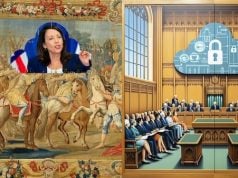 It’s been a breathless 9 years since U.S. District Judge Thomas Penfield Jackson ordered that Microsoft be divided into two distinct companies, ending its hegemony on the PC desktop. That saga came to an end last week with the expiration of the consent decree the software giant signed with the U.S. Justice Department in 2002. But while Justice never saw fit to implement that decision or draw a jagged line of demarcation across Redmond, what would make for a fascinating bit of revisionist history is the hypothetical “what might have happened” science-fiction version if the breakup HAD actually occurred just as Penfield had ordered it.
It’s been a breathless 9 years since U.S. District Judge Thomas Penfield Jackson ordered that Microsoft be divided into two distinct companies, ending its hegemony on the PC desktop. That saga came to an end last week with the expiration of the consent decree the software giant signed with the U.S. Justice Department in 2002. But while Justice never saw fit to implement that decision or draw a jagged line of demarcation across Redmond, what would make for a fascinating bit of revisionist history is the hypothetical “what might have happened” science-fiction version if the breakup HAD actually occurred just as Penfield had ordered it.
Might Microsoft have realized that the core strength of its business was on the enterprise side, closed ranks around its corporate coffers and avoided the expensive forays into consumer media, that, while buzz worthy, have been less than investment worthy for stockholders? (Consider that when the settlement of the landmark antitrust lawsuit against the company was proposed Nov. 2, 2001, the stock traded at $27.63 a share. Last Wednesday the stock closed at $25.36 per share.)
On the other hand, would a spin-off company wholly dedicated to consumer media have been earlier to market with a Zune music player, a social media-oriented “Sidewalk” style smartphone, a Bing decision search engine or have created retail stores or forged alliances with partners like Nokia far sooner?
Would Bill Gates have stepped away from his role as Chief Software Architect and become one of the greatest philanthropic benefactors the world has ever known as co-founder of the Bill and Melinda Gates Foundation?
Would Google have had the same amount of runway for its takeoff, and the same amount of airspeed and cloud clearance? Same question for Apple and Facebook?
 In this high tech, revisitation of “Back to the Future,” it’s unclear which companies start to fade out of the picture like Marty McFly had his parents never met or fallen in love, or just who is the idealistic George Bailey or curmudgeonly Mr. Potter in the Kapra-esque fantasy “It’s a Wonderful Life.”
In this high tech, revisitation of “Back to the Future,” it’s unclear which companies start to fade out of the picture like Marty McFly had his parents never met or fallen in love, or just who is the idealistic George Bailey or curmudgeonly Mr. Potter in the Kapra-esque fantasy “It’s a Wonderful Life.”
By avoiding a breakup and forcing Microsoft to assimilate the avalanche of technologies that have transformed the new media landscape, all under one CEO and inside one corporate boardroom, one could argue that Microsoft became considerably less agile even while maintaining centralized control. The argument might continue that two Microsofts might have provided the kind of corporate reinvention and realignment that would have come just in time to capitalize on the I-generation. They might even argue that Microsoft would have been freer to take more incisive steps into these emerging markets without hesitation or consulting the judicial rule book. They could argue that, and I think they’d be right! – Larry Sivitz, Ed. [24×7]




















